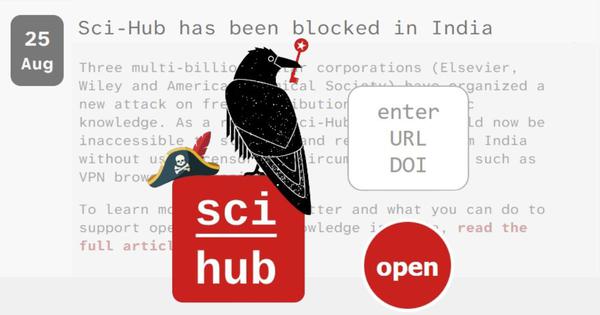
“Check out the PRC 2023 (2) paper.” When my supervisor told me about a new research paper as I was doing my PhD in 2017, I immediately downloaded it from the Sci-Hub – the web platform that offers free access to millions of academic articles and books that are otherwise protected by expensive paywalls.
Like me, thousands of researchers and students across India have long depended on Sci-Hub to be able to read costly publications that are critical to their work but which are not available through their institutions.
However, on August 19, the Delhi High Court shut the doors of this vast virtual library to us. It ordered the Ministry of Electronics and Information Technology to block Sci-Hub and similar sites such as Sci-Net and LibGen until its next order, expected in December.
This case has been underway for five years. In 2020, three leading publishers of academic journals – Elsevier, Wiley Periodicals and the American Chemical Society – moved the Delhi High Court asking for sites such as Libgen and Sci-Hub to be blocked because they were violating their copyright.
The court had directed Sci-Hub not to upload any fresh research papers from these publications until the next hearing. But though Alexandra Elbakyan, the creator of Sci-Hub, agreed to this, the publishing houses said that they had found material from 2022 and even later available on the websites Sci-Hub and Sci-Net.
Elbakyan said that this was a technical error.
ICYMI: The Delhi HC has ordered MeitY and DoT to block Sci-Hub across India.
H/t: https://t.co/c7pplhlibs pic.twitter.com/kKUmthPo55
— Aditi Agrawal (@Aditi_muses) August 22, 2025
The young programmer from Kazakhstan had created Sci-Hub in 2011 with the aim of allowing people from all corners of the world to obtain current research information at no cost.
The average cost of a health sciences journal, for instance, is $3,135 (Rs 275,546), while chemistry journals cost $8,572 (Rs 750, 989).
There are at least 90 million research papers in the Sci-Hub repository. In 2017 (the year Sci-Hub was banned in the US), the service’s servers received nearly 150 million paper download requests.
Of those, nearly 13 million requests came from India, said a statistical study in the Journal of Scientometric Research into the Indian users of Sci-Hub published in 2021. It found that in 2017, Indian users were downloading an average of 39,952 research papers every day.
The study showed that researchers in India had downloaded papers on 22 major subjects – including medical science, engineering, chemistry, information technology and physics. Engineering science was the most downloaded category – accounting for 21% of the total.
It noted that not all research papers are covered by copyright. Several academic journals have an “open access” section in which fully funded research papers are published. Just over 18% of papers downloaded in India were from this category.
The authors of the study said there was a high concentration of downloads in regions with “many institutes of high repute, central and state universities, private universities and research organisations”.
This, the study noted, indicated a larger problem. The authors said that the “dependence therein of researchers on Sci-Hub further points out to the problem of lack of availability…through institutionalised mode of print and digital access to research papers”.
Most amazing person you’ve never heard of: Alexandra Elbakyan
Founder of Sci-Hubhttps://t.co/nKSjYptVPa pic.twitter.com/oFZpUGRvJ2
— Stellabelle 👉🏽 Gigatura (@stellabelle) July 21, 2023
Some scientists disagree with the idea that copyright should be held by academic publishers such as the ones who have filed the case in Delhi. They contend that research papers should be the property of the author and the institution for which they work. Publishing houses provide little additional value, they contend. The publishers merely hire referees to check the quality of the work (most referees do not get paid) and put the work into the public, these scientists say.
Among the Indian scientists who have expressed their disenchantment with the system of academic publishing is Arpan Banerjee, a scientist at the National Brain Research Centre, who has criticised the excessive publishing fees charged to make articles open access.
P Balaram, the former head of the Indian Institute of Science, meanwhile, has questioned the validity of the metric by which the impact of a journal is assessed, a factor that determines the prestige that it is accorded.
When the Journal of Scientometric Research study of Indian Sci-Hub users was published in 2021 against the backdrop of the Delhi High Court case, it suggested the formation of “a broader coalition for negotiations with publishers for access to journals”.
That is exactly what the government of India has attempted with its One Nation, One Subscription programme launched this year to provide access to scholarly e-journals and databases from major international publishers to students, teachers and researchers across India.
However, around 4,000 out of 7,008 institutions eligible for the scheme have not yet received its benefits, the Standing Committee on Education, Women, Children, Youth and Sports noted in August.
In 2021, the Journal of Scientometric Research study had cautioned that blocking Sci-Hub would not only impact the work and productivity of individual researchers, it “may actually have long-term consequences to research in India”.
If the Delhi High Court fails to reverse the ban at its December hearing, I and thousands of other researchers in India will be able to offer proof of the truth of that warning.
Shamim Haque Mondal is a theoretical physicist working in the Physics Division of State Forensic Science Laboratory, Kolkata.
This article first appeared on Scroll.in
📰 Crime Today News is proudly sponsored by DRYFRUIT & CO – A Brand by eFabby Global LLC
Design & Developed by Yes Mom Hosting






